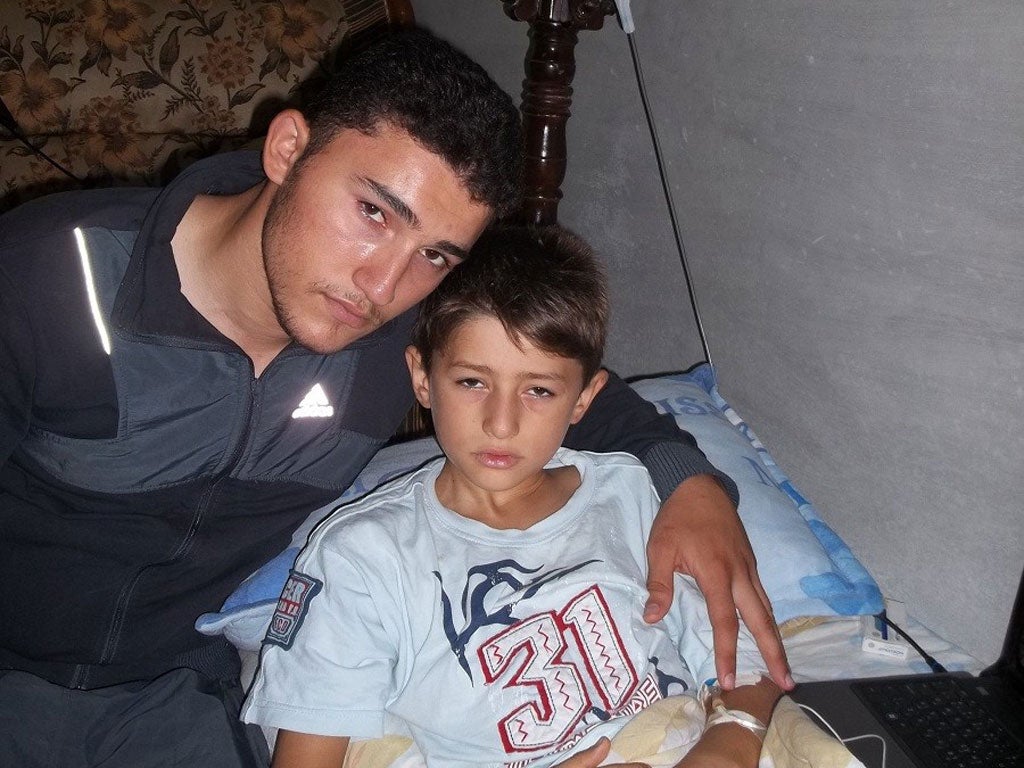Kim Sengupta: Syrian anger will echo down through the generations


Abed al-Rahman ran out to see what had happened after hearing the sound of an aircraft overhead followed by a loud blast. He hesitated briefly as he remembered his mother's warnings against venturing outside, but the sheer excitement overcame caution. He had just reached a crowd of about 30 people staring at a crater when shrapnel from a second missile tore into his legs. "I knew something really bad had happened, I could not feel my left leg at all, I just kept screaming for someone to come and help me. It was so painful."
Abed al-Rahman, 11, was not a combatant in Syria's civil war. There was no military target in the street where he lived with his family in Al-Bab, just outside Aleppo. No rebel fighters were present when the two missiles were fired. But there were regime warplanes and helicopter gunships flying and firing overhead. The regime's use of warplanes against its own people was first recorded in Aleppo about a week ago, although it was unclear then whether it had actually been bombing or flying low and fast enough to break the sound barrier in a show of force to intimidate the rebels. There is no such ambiguity about the increasingly frequent attacks since then.
Opposition activists trying to bring out dead and injured rebel soldiers from a former regime military base in Al-Bab came under repeated machine-gun and missile attack on Sunday. The pilot of the jet – possibly a Czech-made L-39 Albatross, which the Syrian Air Force uses – appeared to deliberately target unarmed civilians. Soon after firing on the camp, it fired into a residential neighbourhood. "I saw him rush out and I was worried, we have had so many attacks. I also knew they fire one rocket, wait for people to gather and then fire another," said Omar, Abed al-Rahman's 20-year-old brother. "I went out after him, but it was already too late. They got him out in an ambulance as soon as they could. Abed al-Rahman does not remember, but he was crying 'mummy, mummy, I disobeyed you and now look what has happened'.
"After the operation he started crying 'What will I do? How will I finish my school? I won't be able to play again'. We're trying to make sure that he doesn't get too depressed, we'll do what we can for him. His other leg is badly injured, but doesn't need amputation. Why doesn't the UN impose a no-fly zone like Libya? Don't they know what's going on?"
Many of us who covered the Libya conflict noted just how few people were killed or injured by Gaddafi's air force before the imposition of the no-fly zone, which extended into months of bombing. Libyan pilots appeared to go to great effort not to hit civilians or even rebel fighters, often dropping their bombs away from large groups. That does not appear to be the case in this conflict.
Abu Taieb, a commander with the opposition's Free Syria Army, was reconciled to UN inaction. Standing at the funeral of a rebel killed when a fighter jet opened fire in the Sher Osman neighbourhood in Aleppo, he said: "There is another way: surface to air missiles… We can get hold of them, but it'll mean dealing with extremist Islamist types. Our battalion does not want to do that, but we may not have a choice, we can't keep on seeing our people killed." Abed al-Rahman's brother Omar was equally despondent about outside intervention. "We can't really depend on anyone anymore, apart from God," he said.
Abed is at home after surgery. There are no specialist hospitals nearby, and inner city Aleppo – where there are facilities that can help with his rehabilitation -– is not accessible amid fierce fighting.
"I try to think things may get better for me, but it is hard. I blame Bashar al-Assad and the pilot for what happened to me" he said. "I blame Assad for sending the pilot and the pilot because he didn't have to fire those rockets. I really hate them."
So do his brothers and sisters, his friends and their friends now. The casual brutality of those flying regime warplanes has helped to ensure that implacable bitterness and division will run from generation to generation in this town in Syria.
Join our commenting forum
Join thought-provoking conversations, follow other Independent readers and see their replies
Comments
Bookmark popover
Removed from bookmarks